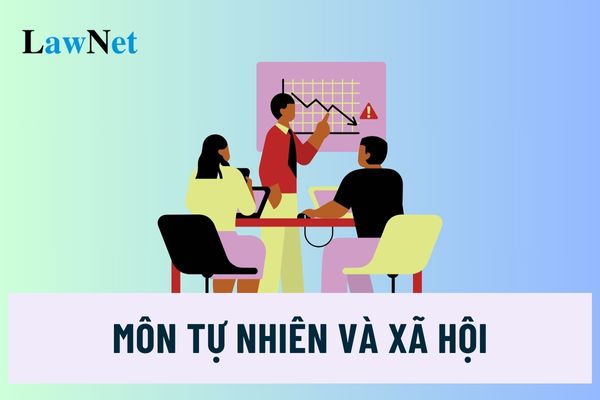Vietnam: What are the orientations on educational methods in the illiteracy elimination program for Natural and Social Sciences?
What are the general orientations on educational methods in the Illiteracy Eradication Program for Natural and Social Sciences in Vietnam?
According to the regulations in Part 2 of the Illiteracy Eradication Program issued together with Circular 33/2021/TT-BGDDT, the general orientations on educational methods in the Illiteracy Eradication Program for Natural and Social Sciences are as follows:
The educational method for Natural and Social Sciences is carried out according to the following orientations:
- Teaching linked to practice, leveraging learners' knowledge and experiences about the surrounding life; stimulating scientific curiosity, aiming towards the development of positive relationships between learners and their natural and social surroundings; guiding learners on how to ask questions, collect information, seek evidence, and use the collected information and evidence to make objective, scientific observations and conclusions.
- Organizing learning through observation. The objects of observation are natural and social phenomena derived from pictures, real objects, videos, and the surrounding environment. Observation activities aim to develop learners' skills in noticing, comparing, categorizing, analyzing, reasoning, and generalizing observed facts.
- Organizing learning through experiences. Learners carry out investigative and discovery activities, applying knowledge to real-life situations around them, thereby learning to address common issues; appropriately responding in a manner that ensures their health and safety and that of those around them; and protecting the living environment.
- Organizing interactive learning. Learners engage in discussion, practical activities, and real-life situation handling, to develop problem-solving abilities, teamwork, communication skills, and self-confidence.
- Flexibly and creatively selecting, combining, and applying educational methods suitable to the objectives, content, students, and specific conditions.

What are the orientations on educational methods in the Illiteracy Eradication Program for Natural and Social Sciences in Vietnam? (Image from Internet)
What are the key qualities and general competencies required for Natural and Social Sciences in the Illiteracy Eradication Program?
According to the regulations in Part 2 of the Illiteracy Eradication Program issued together with Circular 33/2021/TT-BGDDT, the orientation for forming and developing key qualities and general competencies required for Natural and Social Sciences in the Illiteracy Eradication Program is as follows:
- Methods to form and develop key qualities
Learners' qualities are formed and developed through interactions and experiences in diverse learning activities at school and participation in activities within their natural and social environment.
- Methods to form and develop general competencies
+ To contribute to the formation and development of autonomy and self-learning in learners, teachers assign tasks such as observation, reading information from books, utilizing supplementary resources, etc., and reasonable questions to help learners be active, independent, and know how to learn independently.
+ To contribute to the formation and development of communication and collaboration skills in learners, teachers organize group or class-wide learning activities; require learners to share the information they have gathered or content of the lesson and work together to complete a common learning project; provide opportunities for learners to comment and give feedback on the learning products of other students or groups.
+ To contribute to the formation and development of problem-solving and creativity skills in learners, teachers design problem-based situations to enable learners to actively participate in solving lesson problems, use questions, exercises, and practical situations to allow learners to apply combined knowledge and skills learned in real-life contexts; open-ended questions, exercises with multiple solutions, or learning tasks that require creativity; differentiated questions and tasks for various learner groups.
What are the regulations on scientific competence for Natural and Social Sciences in the Illiteracy Eradication Program in Vietnam?
Also in Part 2 of the Illiteracy Eradication Program issued together with Circular 33/2021/TT-BGDDT, the orientation for forming and developing scientific competence required for Natural and Social Sciences in the Illiteracy Eradication Program is as follows:
- To form and develop the component of scientific cognition competence, teachers provide learners with opportunities to utilize their existing understanding and experience in forming new knowledge; organize activities where learners present their understanding, compare and classify objects and phenomena in nature and society, explain certain relationships within the family, community, and nature; systematize knowledge, and connect new knowledge with pre-existing knowledge systems.
- To form and develop the component of exploring the natural and social environment competence, teachers need to create opportunities for learners to propose questions, identify issues that need exploration, and actively engage in resolving these issues.
To focus on learners' observations, reading materials, conducting investigations, and practicing to explore objects, phenomena, and relationships within the natural and social surroundings; collecting and recording data from observations and practices; commenting on external characteristics, comparing similarities and differences between surrounding objects and phenomena, and their changes over time.
- To form and develop the component of applying knowledge and skills to real-life circumstances and appropriately interacting with nature, people, and society, teachers use questions, exercises requiring learners to apply their learned knowledge and skills to solve learning tasks in new, real-life-related contexts, that are manageable by the learners.

